
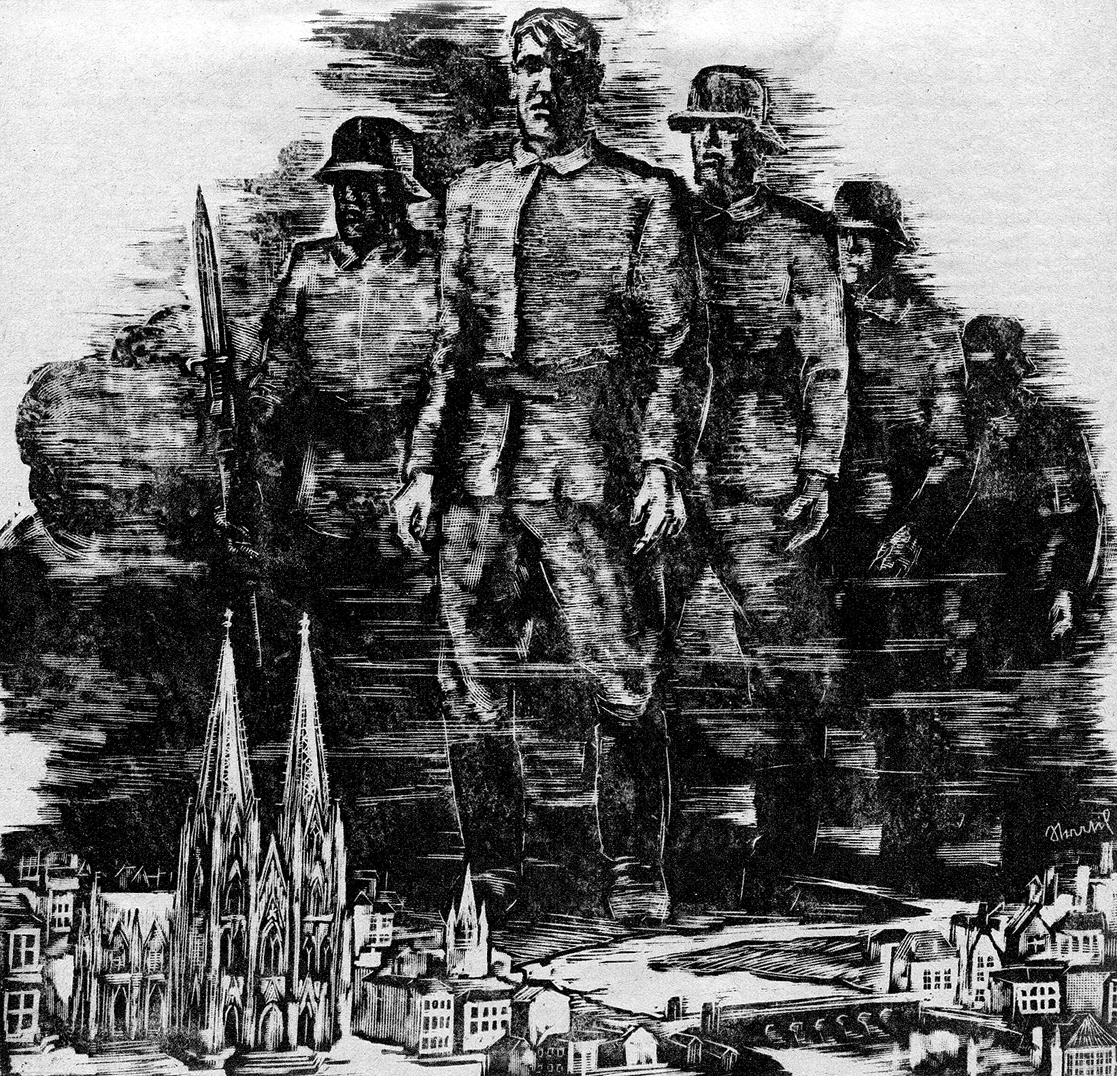
Interview with Franz Josef Holczabek, who lived in Königshütte (Poland) and served in the Wehrmacht from 1940-45. He was in 8th Infantry Division, 90th Infantry 'Afrika Korps', and the 275th Infantry Division.
He was a POW at war's end in the genocidal 'Rheinwiesenlager' (Rhine Meadow Camps) and his wife and daughter died during the courageous Fortress Breslau defense.
Referral from a veterans reunion, Deggendorf, 1989.

Thanks for agreeing to meet me, it is a pleasure. I understand from others you come from the area that is now Poland. Can I ask what you remember of the border strife back then and is it true that the Poles attacked Germans?
Franz: I must say to you it is impressive to see a young man who is interested in that part of our history. Most young people today know nothing about the border issues back then. I was alive and lived it, so I can help you. I was born in 1913 when my home was part of the old Reich.
We lived in peace with the Poles mostly, but I know tensions did simmer in places. The Poles wanted to have their own independent nation, and both Germany and Russia ruled over them denying their demands. After the first war Versailles ripped away German land, along with the German citizens and made them part of a newly created Poland.
This may not sound bad, but it was. The Germans did not want to be part of Poland since they viewed all the modern infrastructure and culture as German. The Poles had no real contribution to the culture of these lands. They were mainly just workers or farmers, and it was Germans who came and built the mines and factories there.
So, you see there was tension when the Poles were now the rulers. Germans protested and went on strikes, which the Poles outlawed and crushed. At the same time wars on the borders broke out largely between the reds and those opposing them. By my border, it was a rag tag mix of fighting. There were cases of Silesians joining with Polish brothers to fight the reds.
I want to tell you there was not always hatred, we were angry about what happened to us, and resented the Poles for accepting this travesty, but also knew not all wanted this. It is true fighting sprouted up between Polish militias and Germans. Who was to blame is not clear, Germans did not want to be Polish and stood up to the government. This brought out militias who were against Germans wanting autonomy.
Fighting started where Polish forces wanted to take more German land to expand their borders and to punish Germans for resisting them. My father was a farmer and refused to take part in any of this. He was concerned with protecting his land and family, but German militias helped protect us. I was very young when it broke out and had little contact with anyone.
I went to a small school, and I remember the Polish government would order us to stay home at times and not allow school. My mother had to read for me and give me lessons unless I was needed in the fields.
I believe by 1923 the fighting died down as German Freikorps units had defeated the Polish militia, but the Polish army was brought in to restore the borders and order. After this I recall the tough times that came. My father complained because new laws were enacted that caused taxes to go up for him and if you could not pay the state took the land.
This caused more rioting and fighting in former German areas, and this only brought about more retaliation. Polish mobs would form and raid German areas as a form of punishment for standing against the new rulers. Many Poles were upset that former Germans refused to be ruled by them, I feel that for them it was a form of revenge for the times Germans ruled them.
They moved in Polish families into farms that were lost due to bankruptcies or seizures. I can recall having run-ins with the children that came. We all traded fairly with other farmers, and when the Poles came my father wanted to have good relations, so he went to meet them. I went with him once and the Pole had 3 sons who were not friendly and made fun of me.
I never told my father, but on the way home I think he knew they had not been kind to me. I heard in school they harassed others as well and bullied the weak. I learned to fight as I would read papers and books that were brought in, and I liked lifting heavy things as much as I could. Later, when I was older, I liked a girl who lived nearby and so did one of these bullies where it all came to head at a dance.
I had learned many sports and was very strong by then. I asked this beauty to dance and immediately he came up and tried to start a fight. I grabbed him by the arm and took him outside where I hit first and hit often. This is how you deal with bullies and from then on, we respected each other, and I had no more problems with him or his brothers.
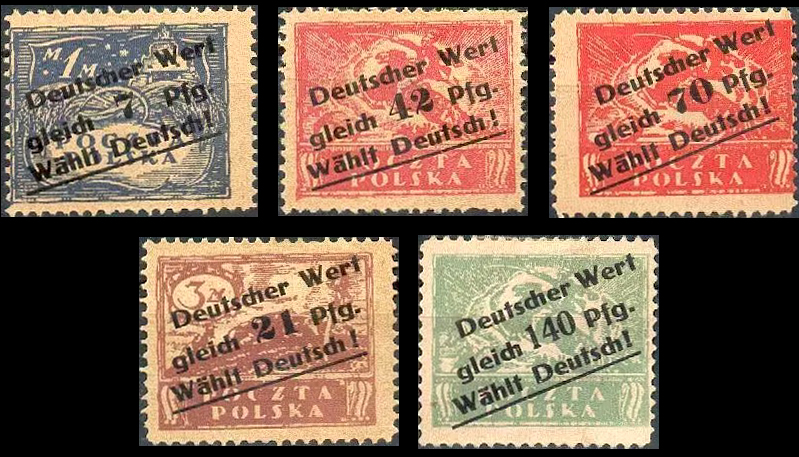
[Above: During the referendum of March 20, 1921 both sides -- German and Polish -- used every means of propaganda to influence the vote. Advertising stamps, postcards and posters were just a few means that were used. Among these efforts fake Polish postage stamps were printed, like this set shown here. These compared the superior German economy to the Polish one, and saying '...choose German!']
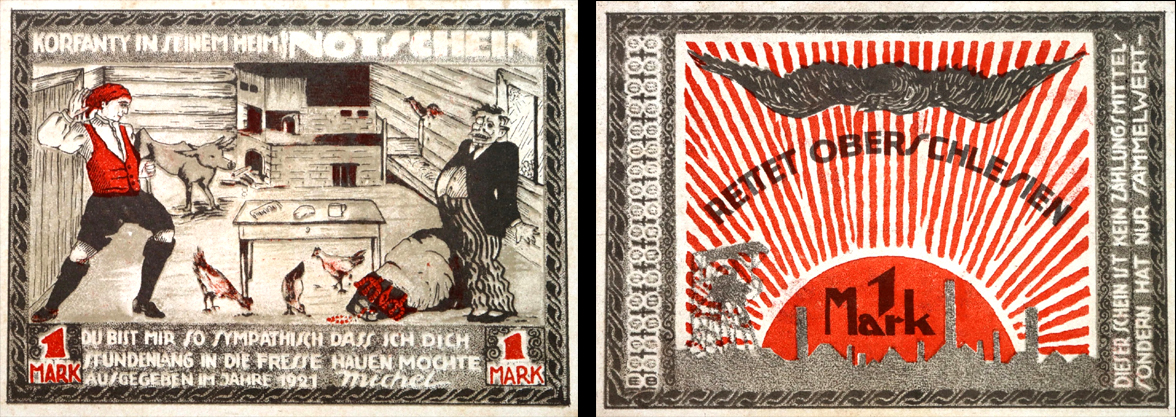
[Above: This is a notgeld (emergency money) from 1921. This shows Wojciech Korfanty, one of the leaders of the Second Silesian Uprising in 1920 and the Third Silesian Uprising the next year in 1921. These were violent Polish insurrections against German rule in Upper Silesia, where Korfanty was accused of organizing terrorism against the German population. Everyone was hungry for German land and resources and that same year League of Nations forced Germany to give up roughly half of the population and valuable mining districts. This notgeld basically says 'Korfanty in his home in Notschein - I like you so much that I wanted to punch you in the face for hours - Published in 1921 - Days of Sacrifice - Heroes of the Nation - Germany'. On the reverse it says 'Save Upper Silesia'.]
I understand you came to serve in the Wehrmacht, can I ask how all this came about?
Franz: Yes, indeed you can. In 1933 I turned 20 years old and needed to find a profession. The border tensions had largely subsided due to many Germans who refused to live under Polish rule sold or gave up their farms and moved to the Reich. However, something else happened in 1933, Hitler became Chancellor of Germany.
One of the main points of his plan was to reunite these lost lands with the Reich. This set off Polish ire and German resistance again. There were calls for more taxes and calls to boycott German goods and farms. This made it hard on us, as we relied on selling to the state to make a profit.
There had always been crimes committed in these areas, some by low life Germans and others by Poles, but after 1933 I noticed an increase. The girl I stood up for at the dance was attacked in a robbery where she was taking milk to the market in town. They stole her milk, cart, and money. I never saw her, but I heard she was roughed up.
It was believed to be Poles from outlying areas who would come in and attack Germans and steal their items and run away. The police were now mostly Polish and while they seemed sympathetic there was rarely anyone caught. I feel they were not motivated to go after their fellow countrymen. I always thought they silently believed in what they were doing, stealing from former rulers to make things right.
By 1935 things were pretty bad for us while we were hearing the Hitler Reich was doing very well. My mother suffered a heart attack that same year and the doctor in our town had no proper equipment to help her. We were allowed to come into the Reich, and she received good treatment. I met a nurse while in Breslau who asked me to the movies, my first time on a real date.
At the same time, I went to a weightlifting match and saw an army recruiter set up. I learned three things on this trip, I liked nurses, I wanted to move into the Reich, and I wanted to join the army. My father was tired of having to deal with all the regulations and taxes in Poland so in 1935 we left the area and were welcomed home as a new wave of refugees. Later on, when things became worse, a special department was set up for those fleeing persecution.
My father was able to buy a small plot of land so he could keep making a profit, and I enlisted in 1936. I was taken into the 8th Infantry Division as a foot soldier and did my 2 years' service time. I was then sent home in 1938 to help on the farm. I was in the reserves then and became married to the same nurse I met earlier.
Can I ask you next what caused the war with Poland, and did you serve in the fighting?
Franz: This might be hard to explain to you, you would have to have lived it to maybe understand. Remember what I said about Hitler wanting lost land back? Well, he tried to negotiate many deals to that end, and did reclaim much of the lost territory in the south, and Memel, but Poland would not budge.
His requests were met with scoffs and calls for violence in some of the Polish press. These calls again brought out angry mobs of Polish militias, and Germans who agitated for a reunion. There were fights due to this and open attacks on both sides. Germans started fleeing more and more and by 1939 this was enough to alert Hitler that something was wrong here.
I knew of stories and accounts from survivors where gangs or militias came onto German soil and attacked farmers. They burned farms and fields and attacked families where some even died. In Poland harsh measures were taken against former Germans. Meaning they refused to buy any German crops, forced Polish goods to be bought, and called loans so they could seize land.
I am not saying former Germans were all innocent, as they did fight as well, but Hitler saw all these as Polish provocations. The killing and rapes of former Germans, Polish border incursions, and a refusal to negotiate at all led to the attack on September 1, 1939. I was recalled to duty in August and many of us knew this was it.
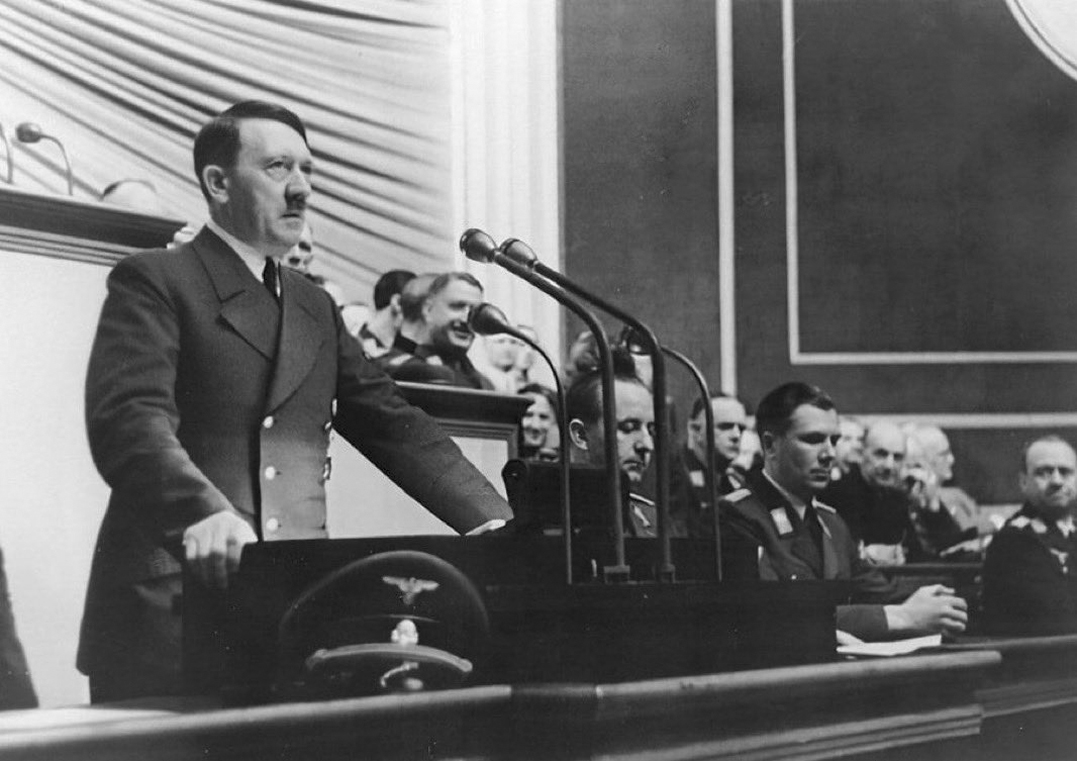
[Above: Adolf Hitler's Reichstag speech of September 1, 1939 on the day of the German invasion of Poland.]
What was the fighting like in Poland, and how did you view the Polish soldier?
Franz: I will tell you something first to dispel a lie. On the eve of the war, we were called together. Many of my comrades were from the areas close to the border areas, some like me were from former German land. Our commander told us we were going to war, and we were not at war with the Polish people, only the government and armed forces.
He told us that innocents must not be harmed and that all civilians were to be treated as friends unless they proved otherwise. That morning we went into Poland and headed to Krakow throwing off any resistance. The Poles had tried to organize defenses, but our new planes smashed them to smithereens. They would try to ambush us or come on our flanks, but were defeated each time.
They had a very large army that was well-equipped and trained, some units even had former German officers. They put up a hard fight in places, causing us losses, but they were not organized well enough to overcome the Blitzkrieg.
We used Panzers to smash their lines, along with the new Stuka that scared the piss out of them. Before the Bug [river] we had a mass surrender after an air attack. They were massed with a large group and pounded into submission. Now I want to tell you something. The Polish and British press say our planes targeted and strafed civilians here.
This is not true, I read a pamphlet dropped by German planes in both Polish, Yiddish, and I believe Hungarian. This was telling any civilians to not get mixed into any military units as planes cannot sometimes see who a target is and who is not. Some comrades have said it seemed like Polish units hid amongst civilians at times to avoid attacks.
I will contrast this with how we behaved later in the war. Where the Allies shot up anything on the roads and in the fields. We had to force civilians off the roads and away from us to avoid this, but it did not help, as they were made targets like us. I know the pilots were given orders to avoid any and all civilians, so the stories of us shooting and strafing them as a game is a lie.
I found the Polish soldiers to be very friendly and once the fighting was done, we got along very well. We moved deep into Poland, as did the Russians whom Hitler made a peace deal with. Poland fell in 4 weeks and then we took stock of it all. We had a lot of prisoners whom we had to feed and shelter. We would speak to them like soldiers and held no hate for them, often times playing games with them or talking about home.
As soon as the fighting was done, we were put to work helping to rebuild what war destroyed. Since I was a farmer, I helped with the harvest that fall so the people had food. Then we were moved west for what we knew would be a fight with France.
What was the war with France like?
Franz: To be honest I was scared. France had a massive army, as did Britain and we had to fight them plus the other nations who were in the way or aligned with them. You see we had to march into Belgium, which we had no quarrel with, but they made it clear they sided with the Allies. They refused any German requests for access and so forth.
So, we marched uninvited, and most of their soldiers surrendered due to not believing in the fight. Some did however and put up small fights which Panzers and Stukas broke again. We came into France and my regiment was part of the push to Dunkirk. We trapped the northern armies there while the main attack broke the back of the French Army who had concentrated in the north.
You know what? The trapped BEF [British Expeditionary Force] and French were able to sneak away. The Luftwaffe was allowed to bomb them on the beaches, but we could not attack to close the ring. I remember a captured Tommy was brought in where we could all speak to him during this pause. I could not speak English, but he seemed very friendly.
Our morale was damaged to know that they all were able to escape later and go to England. Hitler either made a big mistake bordering on incompetence or maybe it's true he let them go. The war could have been won there at Dunkirk. Once the area was secured, we felt victory, and my regiment was one of the first to march into Paris.
I remember it was quiet, with a lot of smoke from burning facilities outside the city. There were some civilians who came to see what was happening, and they were either indifferent or friendly and waved. After our entrance we set up quarters, and some of the people came to sell us food or goods as soon as we settled in.
Once the fighting was done, as in Poland, we were used to help repair any battle damage. I was on occupation duty for only a short time however as I was sent to school in Germany to become a sergeant. This then led me to then be moved to Prussia in readiness for the battle against Stalin.
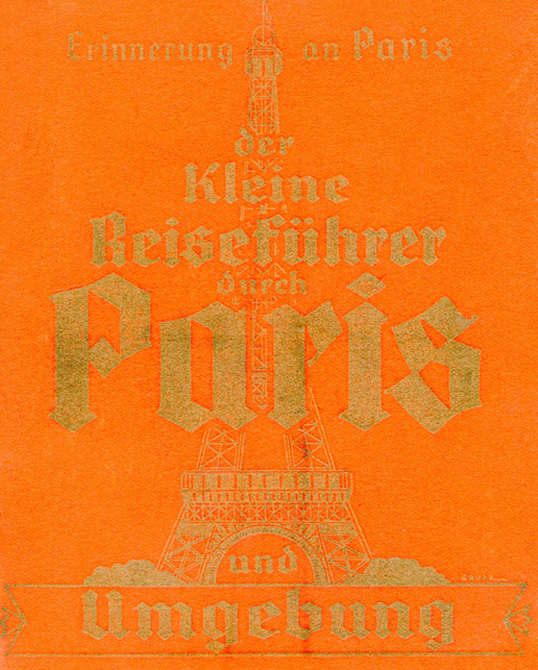
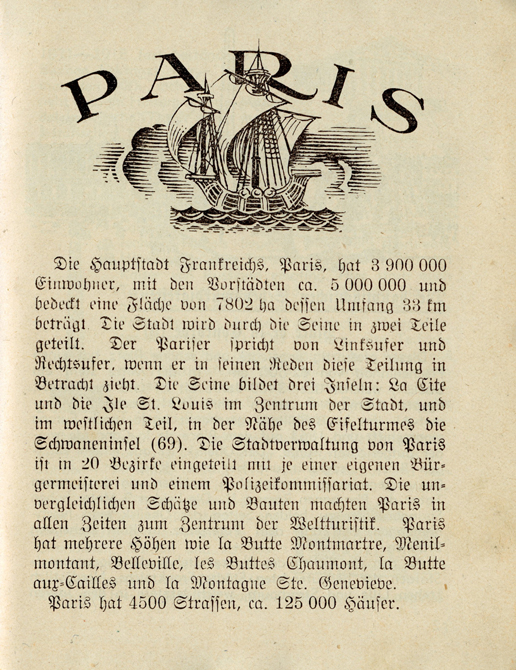
[Above: 'Erinnerung an Paris - Der Kleine Reiseführer durch Paris und Ungebung' (Memories of Paris - The Short Guide to Paris and the Surrounding Area). 32 page French tourist guide for German soldiers. This was made by the DOMPOL company out of Paris. The first page of the booklet says: 'The incomparable sights and buildings have made Paris the center of world tourism throughout the world'. It is so sad that now the once beautiful Paris looks like Africa, like so many other Aryan countries. This is the price of defeat. This is the world of the 'good guys'. Aryan man and woman, you have been deemed too dangerous to exist, what Germany and her allies almost did was not to be forgotten. The enemies of mankind seek to murder the white race, which Germany tried to protect. What we see today, the low birth rates, degeneracy and chaos is a mirror of the 1920s Weimar Republic, but worse. Adolf Hitler set our enemies plan back by many decades, but it is still very much in action. Wake up or die.]
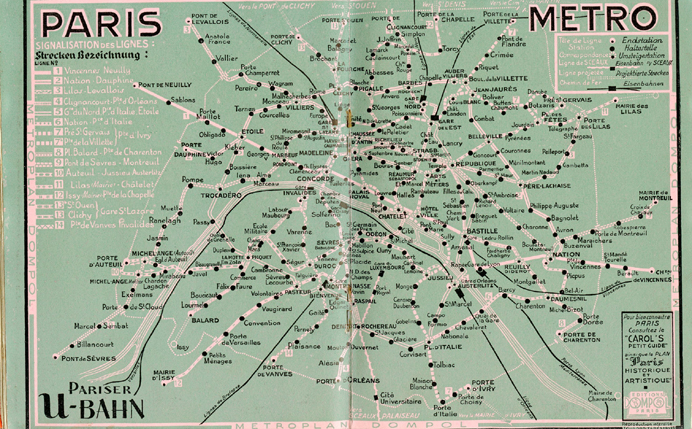
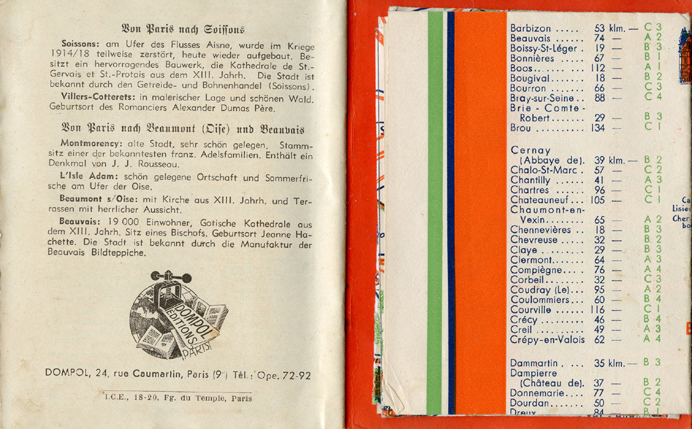
[Above: This contains a large map in the center of the booklet of Paris, and a huge two-sided folded map glued to the back of the booklet.]
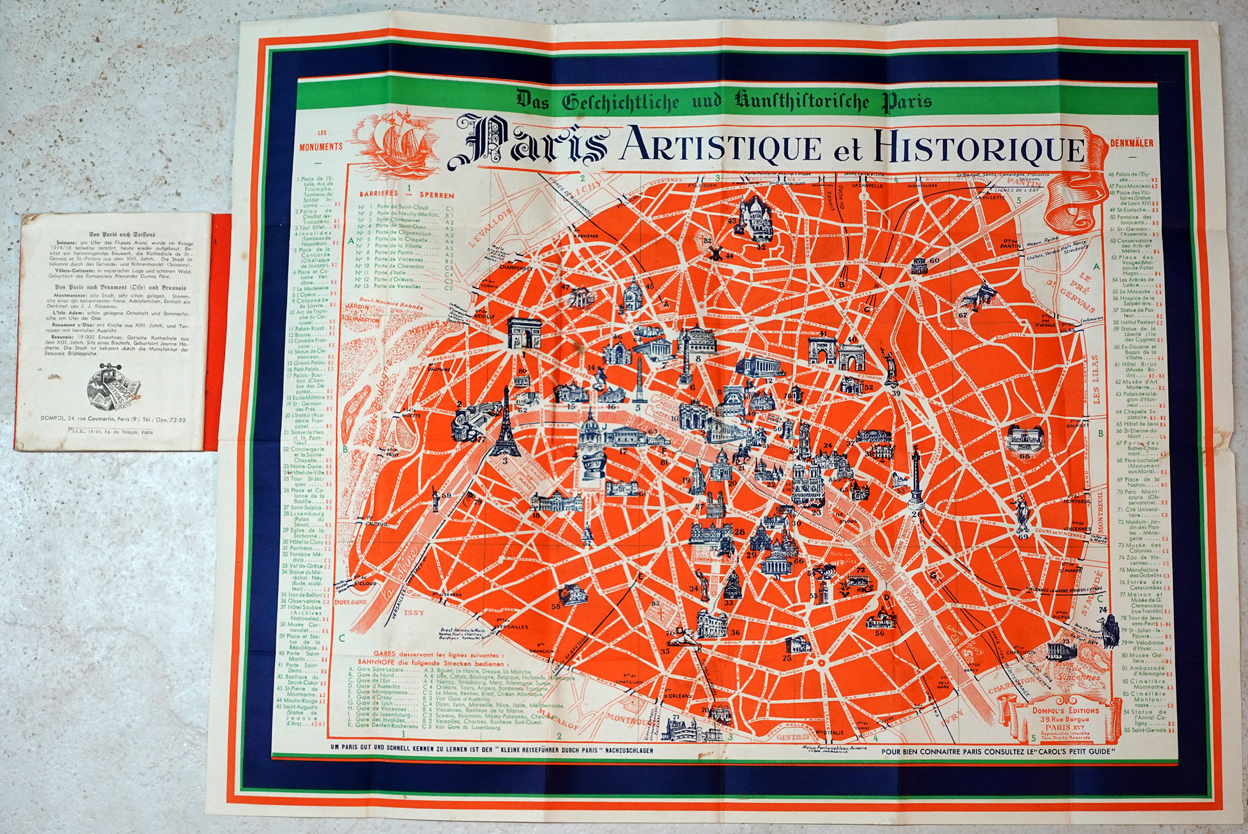
[Above: Map unfolded.]
What was the war against Russia like, and what did you think of the Russian people?
Franz: My division was made ready in June for the attack, we knew what was happening, but everything was quiet. We went in as part of the center and part of the push to take Moscow. I ended up being wounded before the Stalin Line [a line of fortifications along the western border of the Soviet Union] and sent back to Warsaw for healing. It was just a grenade splinter to my side.
My wife came to look after me as well, since she was a nurse in Breslau and was able to get me home. I was put back in order and sent back to the front in October, only to see my men on their last leg. The push to Moscow was a tough one and sapped all our strength. Ivan hit us with fresh men and massed artillery the closer we got.
I was wounded again but not bad, so I stayed with my men. I think it was by that November we ended up being sent to France to rebuild. This was just before the large Russian offensive hit; it stopped the advance and pushed the Wehrmacht back. For me I remember thinking the war was now lost. I knew Russia to be a large mass with more than twice our population.
I told myself if we could not defeat Stalin that summer, and he survived, they would only get bigger and stronger. They did. I can say that to you now, but back then I had to be careful not to affect the morale of my men. When your nation [USA] came into the fight, I knew then for sure we had cooked our own goose. I thought it would take a miracle greater even then Old Fritz, Frederick the Great, to win.
I will tell you that as for the Russian people, we again were told we were at war with the government, not the people. We were friendly to them when they were friendly, and indifferent when they weren't. Stalin tried to force all the people to move east with the army, but many could not pass the rivers, so they were stuck and returned home.
We would stay with them when at rest and help many to repair or improve their huts and farms. Most of the people were forced into communist collectivization, they had to live in communes to help produce. The Russian Army burnt down several of these newly built towns to deprive us of shelter, so we had to rebuild them.
I have many photos I took of my time in the east, and many show my men interacting with these simple people. There was no hate, and we were not in a war to kill them as the Soviets claim today. From what I saw back then, there were rarely any instances of attacks or crimes. Let me give this example in my company: we had a young boy who was caught stealing our bread, and our officer questioned him. It was found out his mother was pregnant by several months and could not come to ask for help. Our doctor was sent to her, along with several days of food for the children. Even a few toys were quickly produced by those who could whittle wood fast. That is what I remember from the east. To hear it today one would think we had orders to loot, pillage, and kill the civilians if they showed themselves, this is a great lie.
What happened to you once you were back in France?
Franz: We got to go on leave for a month to enjoy the holidays and life was good. You would not have thought a war was going on. Germany was like in peacetime; the restaurants were full, as were cinemas, bars, clubs, and even the circus was still going on. Other things were happening as well, as our child was conceived during this leave. You will understand a soldier has his needs while home. Yes.
Once we settled into France, I was advised I will be assigned to a new light division that was headed to Africa. I was not happy with this, but they wanted people who had already been to the front. I was now wearing the Iron Cross, Wound Badge, and Infantry Badge, so I was seen as an old hare now.
I was sent to the south of France and then Italy to do desert training and get tropical equipment. From there it was on a transport to Libya which was luckily not attacked, rumor was the one before ours was all but destroyed. You could just feel the war shifting at this point. Once our paybooks were stamped on African soil, we were ready to get at the British.
I was amazed at how hot it was there, and how cold it was at night. We had a main road that was dusty and full of flies. We even saw Rommel once, when we got closer to the front. I learned he was always at the front, to his peril. We could always see our planes or Italian planes overhead, the sky was still mostly ours. Later that would change.
I have not met many who were in Africa, what do you remember from the fighting? And again, I like to ask how a German viewed the civilians?
Franz: Well, I can tell you we viewed them here as we always did, we relied on them to help us. A civilian could always help with food, water, or shelter. So, it was pertinent for us to always be kind, and show we were peaceful. In Africa it was very European in Libya, many people from all over settled there. We met French, Spanish, Italians, and Greeks, but I will tell you the Arabs were the friendliest.
In our division, you would have thought we were the Foreign Legion, or an international army. There were Arabs serving, along with French, Spanish, and Africans from the continent. They all shared a desire to see Britain lose its grip here. I remember a day where a ship came in that had somehow sailed in past Gibraltar and brought supplies of rare fruits from South America, we bought all we could afford.
The Bedouins were roaming herders, and they would report on the enemy, though some also reported on us as well. They traded with us and would have great dinners we sometimes were able to sit in on. I can't remember any time there were really any issues with civilians.
Even the prisoners I saw were very happy and jovial, there was no sense of hate. It was almost like a sporting event where the loser accepted defeat and then was friends with the rival. I saw a card game being played between Italians and an officer they captured, they even had wine. We were jealous.

[Above: African auxiliary and two German Afrika Korps soldiers. Note the distinct German 'pith' sun helmet worn by the rear soldier.]
What was the fighting like in Africa, and what happened to you after?
Franz: The fighting was fierce when it happened, but largely in 1942 we had Tommy on the run, Rommel pushed them all the way back into Egypt. There ended up being a big offensive and battle around El Alamein. We lost this battle due to not having enough supplies and reinforcements coming to us.
Remember I said the war was lost when America came in, here it showed. Our supplies were being sunk, while Tommy received more than enough. We really enjoyed whenever we could capture a vehicle with rations, they had so much food it was a joke among us. Any supplies we could capture made our day. We had to fend off air attacks since they now had a much larger force than we did. We were forced into a retreat, which many believed would only be temporary since Rommel had done this before.
It was also rumored that more divisions were being raised to come to our aid, and that forces from Turkey might be coming. Rumors at the time were all over the map, we were told Japan may even come via Ethiopia. Our retreat took us weeks to complete and here I was wounded, quite severely.
We were near the border with Tunisia, I was in an Italian truck, and we were attacked by planes. The damn driver panicked and drove off the road into a very big ditch which I did not see coming. I was thrown from the truck and hit against a rock pile. I had broken bones, cuts, and was bleeding inside they said.
I was taken to an aid station and stabilized. I remember after a few days I was able to understand my plight. I needed better care, and they were quite concerned about evacuating me with other wounded. I was taken to Tunis and was put on a ship and sent to Sicily, then on to North Italy, and a train home to Breslau.
I was home all of 1943 to heal and I had been fortunate in the war so far. I was with my wife and child, and in good spirits. The news was not all good; cities were being bombed, territory lost, and comrades were reported as fallen. I learned in May 1943 that the Panzer army in Africa had surrendered. So that was the end of my adventures in Africa.
How did the war end for you? Can you tell me what all you saw and went through?
Franz: It did not end well my friend, not well at all. It was a nightmare to live through those last years of the war. I was assigned as still fit for duty, but limited. I was placed in a training battalion for the 275th Infantry Division and sent back to France to train boys for the upcoming invasion. This new division was put together from remnants of other divisions.
I met an old comrade who suffered the same fate as myself and was now part of the training cadre here. We enjoyed French hospitality and wine very often to take our minds off the war. The new recruits coming were mostly all conscripts and did not really want to be in the fight.
It was a job to get them to come together as comrades willing to die for each other. That was the sad reality of where we were in this war. The training and drills went on right up to the day of the invasion at Normandy. The division was sent piece by piece to the front. The training battalion stayed back to organize replacements, and so on.
We would pay attention to the fighting as best we could but by July, we knew it was done, in August the front was broken, and I was thrust into the retreats back to the Reich borders. We had to escape from many pockets where the Americans and British tried to trap our forces. I saw the air power here for the first time.
It was maddening that you had to watch the skies at every moment. The Jabos [American fighter planes] would scream down with little warning and shoot up anything they saw. They did not take care to know what they shot at; everything was the enemy. During these retreats I saw Red Cross marked vehicles, civilians, and animals who had been shot up.
It was not until September that we arrived where it was safe and could repair ourselves. I was granted leave that November which was the last time I saw my wife and daughter. We were made to set defenses along the Reich borders, this was a surreal time. Everyone from old to young, man and woman, prisoner and free were used.
I had lost faith in it all, I will say to you; I saw no need to keep going and wanted the war over. From here on out it seemed like a waste of life that could be avoided. The Allies clearly possessed an overwhelming superiority in everything. They controlled the skies; we would see the bombers often and nothing could stop them.
We thought about all the stories comrades were sharing of family and friends lost in the bombings. It was a morale killer for many, and that was the intention of the terror bombings. They say today Germany started it all by bombing Poland and Britain, but as I see it what we did was nothing compared to what they did. Our planes bombed military targets with the intention of stopping war production. Or if a city was made a fortress, it became a legal target.
The Allies' stated aim was to kill as many civilians as they could to lower morale. We could all see they no longer were trying to hit only war production, in their eyes everything was war production, even babies. The more deaths they caused the better it was as it demoralized the fronts. They were wrong about this, as even though we all knew it was lost it made many people fight even harder.
I was moved to the area where the battles for the Hurtgen area were being fought, helping with reinforcements. I can tell you that I was thinking of deserting at this time due to the situation in the east. The Soviets had pushed the front back to the borders and were threatening Breslau. I sent my wife a letter saying it was important to get out and move to the middle of the country.
I don't know if she ever received the letter but by February the city was besieged, and I was sick with pneumonia which put me into the hospital until March. At this time the Americans came, and I was made a prisoner. For me the war was over. I was wanting to find my wife and the Americans were quite evil in their refusing us cards to write on or Red Cross protection.
All kinds of things went through my mind, I wanted to escape or do anything I could to head home. As more prisoners were brought in it did not look good. The stories being told from the east were horrendous. Berlin was lost; Breslau I was told was nothing but ruins. The Americans moved us into the Rhein area and into holding camps.
It was announced that the war was over on May 8th, so our spirits were lifted a bit as we had survived. This quickly turned to outrage when they announced we were being held indefinitely to work out where we fought and war reparations. Many of us thought they did not learn anything from the first war.
Many of the sick were brought into these camps, and with no medical care they started dying, men would stay away from the sick as well, so not to catch anything. The truth about these camps is hidden today, as we stayed in them for months and very little food and no care was given. Many of the weak and sick died in these camps. It is said it was deliberate, and it sure seemed like it.
I was lucky that I always happened to be around when food was handed out. On one day after being in the camps for two months I happened to be in a group that was approached by a guard who asked if any of us could drive and had animal experience. I raised my hand first and was taken out of the camp. I was placed in the motor pool.
One of the first kind acts was they had me checked over by a doctor and given a nice dinner. I felt my fortunes had changed here. I was driving an American animal doctor around who was a German that came back as part of the occupation. He was very friendly to me and made sure I had food and paper to write letters. I even explained my situation to him.
He told me that the east was no place to go yet, and he would see if he could arrange for my release and papers to go home but said that the Soviets could legally intern me since I fought in the east. He advised me to hire someone to go and investigate what happened to my family. This made me angry, but I trusted he was telling me the truth.
I was able to meet other prisoners who were now being released from POW status, those of us from the east did face a dilemma, to go home meant possible arrest by the Soviets. This was September of '45, and I made the decision to try to go, I had reached out to the Red Cross and all the other agencies set up to find the missing.
I had heard nothing from my parents, wife, or friends of ours. I set off on foot, catching rides and trains. The Americans had given essential paperwork, and the doctor wrote me a pass letting anyone know I had worked as a vital Army of Occupation driver. I still own these passes, they saved me. I went through my first Soviet check point with a lot of people, and I was terrified.
The soldier was an eastern one and looked my papers over and stamped them with his authorization, and I moved on. I felt relief. I was able to get to Breslau but what I saw is beyond description. The city was a shell. I went home, and it was a pile of ruins. I went to aid stations asking about my wife and was advised that it was likely my wife and child did not make it.
I remember a very stressed woman pulled me aside and asked questions of me and after I told her where we lived and also my parents, she said she could not help. She lost her children and parents and was looking for them as well. We wished each other well and continued our search. I stayed in the city for a month until the cold weather came.
At this point I concluded, after speaking with a fellow on our block, that they could not get out. The order to evacuate was given but came too late for many, the speed of the Soviet advance was miscalculated. The roads were already clogged with people fleeing the Soviets, so many in the city stayed put. It was considered a safe place since there had been no bombings.
The Soviets came almost overnight and surrounded the city before many could leave. They started bombing and shelling all areas. It was turned into a fortress, but the civilians had no way to get away from it all, so they suffered and died as the soldiers did. It was madness. Our building had a basement, and I believe my wife stayed there. I learned that many tried to leave but gave up and returned home due to the bad weather. She had family but no one heard anything from her after January of '45.
She and my daughter were likely killed in the bombings or shelling as I heard they pulled many casualties out after it was all over. They were usually never identified and buried in mass graves. My parents just disappeared as well with no trace at all. I believe they may have tried fleeing west and were caught by planes, the fighting, or the weather could have gotten to them since it was very cold.
I returned to the west and resolved to build a new life. I worked for the Americans some more and by 1949 things had changed. The apathy had given way to mercy and all kinds of aid now came to us. We could start to rebuild the cities and put the past behind us. I met a woman from Poland who fled as a refugee who ran a restaurant out of nothing more than a hut.
I would stop by almost every day for a sandwich or soup, and we would talk about the war and what was lost. She lost her family so we learned to grieve together, and soon we had a bond that would turn into marriage and a new life together. With the changes in the east happening, it is my resolve to try to go back home again and search for answers. With things opening up maybe someone will have new information.
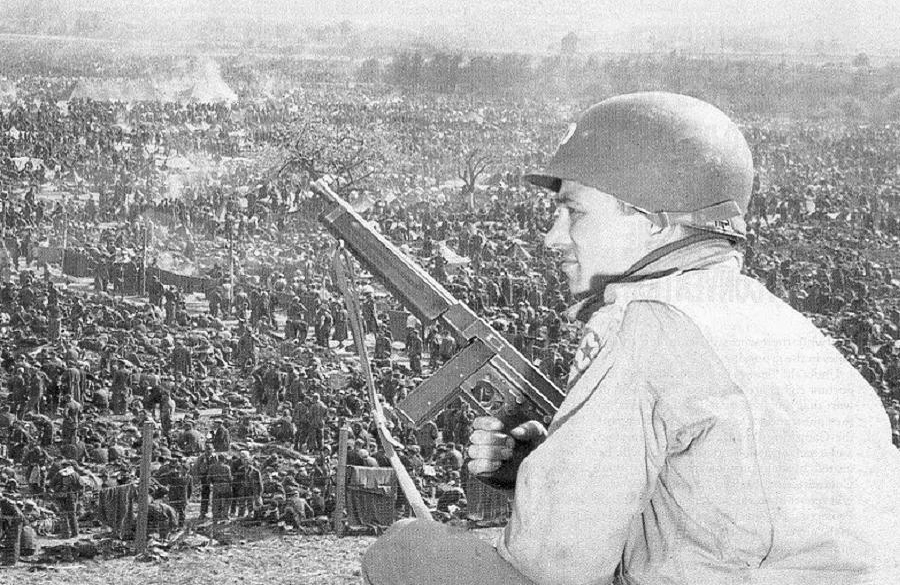
[Above: The Rhine Meadow Camps were nothing more than open air death camps, no food, no shelter and no medical care... millions of Germans would die AFTER the war.]
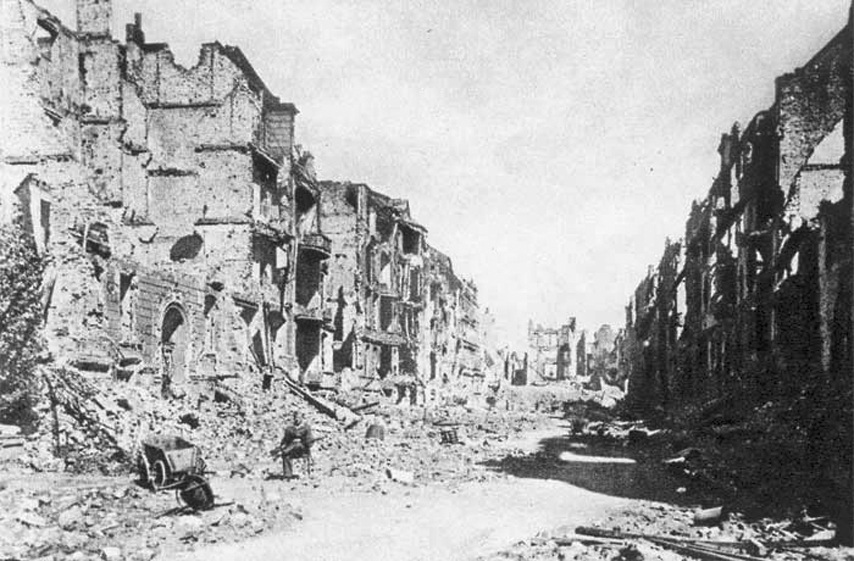
[Above: Breslau... Germany became a graveyard for daring to resist the international criminals who rule this world.]

Back to Interviews
















